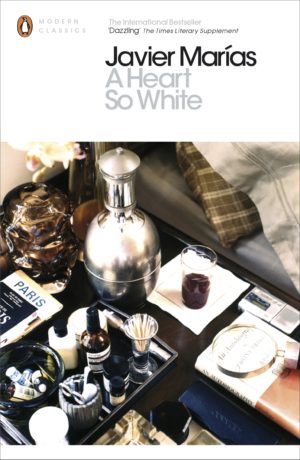The opening chapter of this IMPAC Award winning book alone is worth the read. A young woman, just back from her honeymoon, shoots herself in the bathroom of her parents’ flat during a Sunday lunch. More than the suicide itself, Marías is interested in how people react: ‘…her father didn’t get up at once, but stayed there for a few seconds, paralysed, his mouth still full of food, not daring to chew or swallow, far less to spit the food out on to his plate’. As if in a slow-motion film, the guests run to the bathroom and the shock of what they find there leads them to do utterly inappropriate things: ‘One of the guests couldn’t help glancing at himself in the mirror, from a distance, and quickly smoothing his hair…’ What? We may think, but isn’t this exactly what could happen? And a slow-motion film this book is, so if you don’t enjoy detailed, contemplative writing, stop here. If you do, however, you’re in for a treat.
The suicide is just the prelude, albeit an important one, to the story. Fast-forward thirty something years and our narrator Juan is on a honeymoon with his wife Luisa. In the sweltering Havana night, through the open window, they overhear a lovers quarrel in the hotel room next door. This is the starting point for Marías’ theme: who we are depends on what people know about us, what we choose to tell and what we keep as secrets (sometimes unintentionally – ‘How many things are left unsaid in the course of a lifetime or a story, sometimes without our meaning to choosing to do so?’) It turns out that Juan’s father, Ranz, is carrying a terrible secret that, once revealed will change him in the eyes of those around him forever. One, which perhaps, Juan regrets unearthing.
Marías is also interested in (and somewhat uneasy with) the institution of marriage, and how much (or how little) we reveal about ourselves within it. ‘Now what?’ is all Juan can think about on his wedding day, the sense of claustrophobia is acute, and this is perhaps where Marías starts sliding into what could be construed as slightly macho, sexist territory. Most of the women in his books (with the notable exception of Luisa who reappears in many of his stories) are described in terms of the length of their legs, the shape of their lips and hover on the periphery of the story, often as victims. Marías claims he’s just reflecting the way men treat women in real life. His own record as a womaniser makes me wonder…
Nevertheless, I still love his books (read our review of The Infatuations); his intelligent, soul-searching writing redeems him, in my mind. As Marías tells a story, he pauses to reflect on how what he’s just written makes the narrator or the other characters feel. He digresses into questions of morals and philosophy. His books are not easy reads but dense and largely descriptive. Phew…you might think, but actually, it works. It works because Marías has a profound understanding of what it is to be human and an accomplished ability to communicate it. And it works because every time I picked up this book I was immediately drawn in and absorbed by the magic of his storytelling.
A Heart So White is published by Penguin Books and translated by Margaret Jull Costa, 279 pages.





